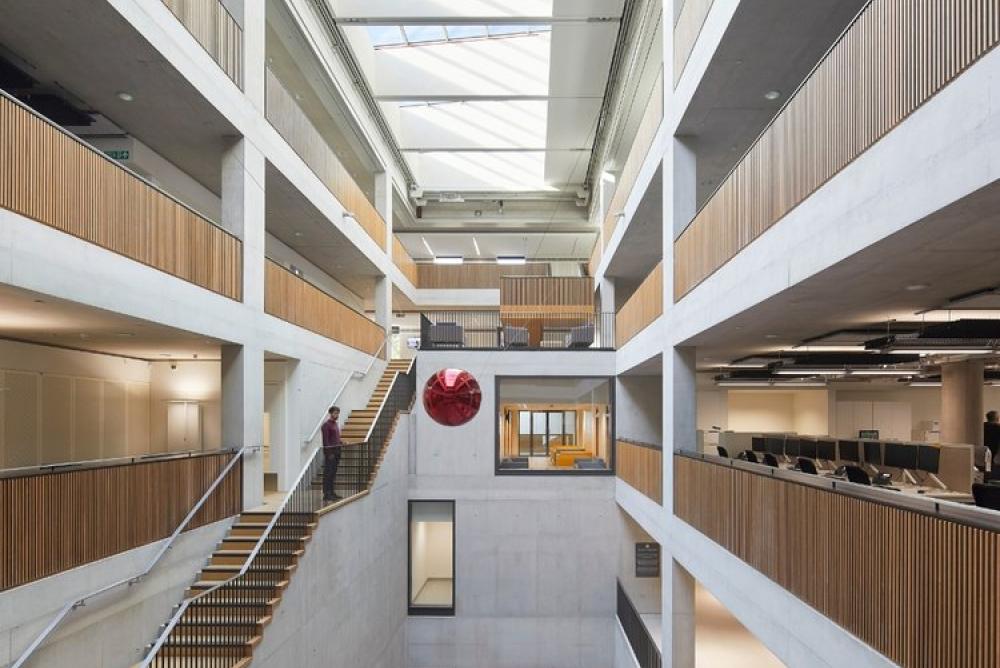Celebrating the Zayed Centre for Research’s fifth birthday
October marked the fifth anniversary of Great Ormond Street Hospital’s (GOSH) Zayed Centre for Research into Rare Disease in Children (ZCR). To celebrate, we look back at just some of the centre’s key achievements over the last year.
About the Zayed Centre for Research
The ZCR is a partnership between GOSH, University College London (UCL) and Great Ormond Street Hospital Charity (GOSH Charity).
A leading centre for innovative research and exceptional clinical care, it brings together pioneering research and world-leading clinical care under one roof, accelerating the bench-to-bedside progress of new diagnoses and treatments for children nationally and internationally.
The centre was made possible thanks to a transformative £60 million gift from Her Highness Sheikha Fatima bint Mubarak, wife of the late Sheikh Zayed bin Sultan Al Nahyan, in 2014.
Groundbreaking contributions to children’s health research
The ZCR’s goal is to advance new tests, treatments and cures for children with rare and complex diseases.
Since it opened its doors in 2019, it’s already made groundbreaking contributions to children’s health research – placing itself at the forefront of medical innovation.
Below are just three of the centre’s many achievements in the last year alone, demonstrating its unwavering commitment to improving the lives of children with rare or complex diseases.
Curing ‘incurable’ leukaemia: June 2023
Three young patients with relapsed T-cell leukaemia were treated with base-edited T-cells in a groundbreaking collaboration between UCL and GOSH. Published in The New England Journal of Medicine, the NHS clinical trial showcased how donor CAR T-cells were gene-edited to fight leukaemia.
This first human application of base-editing technology was designed and developed by a team of researchers at UCL, led by Professor Waseem Qasim, UCL Great Ormond Street Institute of Child Health (UCL GOS ICH) and Honorary Consultant at GOSH, based at the Zayed Centre for Research.
Professor Qasim worked with Dr Robert Chiesa and the Bone Marrow Transplant/CAR-T/Haematology teams at GOSH.
Among the patients was 13-year-old Alyssa, the first person to receive the treatment for T-cell acute lymphoblastic leukaemia. Her leukaemia became undetectable within four weeks, and she later had a successful bone marrow transplant. Another teenager experienced similar success, while a third patient, despite responding to the therapy, faced serious complications and transitioned to palliative care.
The cells were manufactured as part of a long-standing research programme led by Professor Qasim at UCL GOS ICH.
Thanks to early funding from GOSH Charity, Professor Qasim has been a pioneer in developing new CAR T-cell treatments using innovative gene editing techniques.
You can read more about this breakthrough on the UCL website.

New Insights into Noonan syndrome: December 2023
In Autumn 2023, Professor Juan Kaski and his team of researchers at GOSH examined the clinical features and outcomes of patients with Noonan syndrome with multiple lentigines (brown spots on the skin), known as NSML, and hypertrophic cardiomyopathy (HCM).
NSML is a rare inherited disorder affecting the skin, face, ears and heart, with HCM being the most common cardiac issue. HCM causes the thickening of the heart's left ventricle, leading to severe complications over time.
Professor Kaski is the Director of the UCL Centre for Inherited Cardiovascular Diseases at the ZCR. This is one of the largest centres of its kind in the world, seeing between 6,000 and 7,000 patients a year from around the globe.
Professor Kaski and his team conducted a retrospective study over 2002–2019, across multiple centres, of children and adults with a genetic diagnosis of Noonan syndrome with multiple lentigines and HCM.
The team aimed to understand the disease's natural history by tracking progression in children, helping clinical teams assess risks and treatments. They studied the timing of dangerous heart rhythms, sudden cardiac death, heart transplants, and implantable cardioverter defibrillator (ICD) shocks. They found that patients with more hypertrophy (thicker left ventricle) had a poorer prognosis, while one-third showed a reduction in wall thickness, termed "absolute regression," over time.
Although rare, the most common cause of death in children with HCM is sudden cardiac death. In 2019, Professor Kaski developed the first calculator (HCM Risk Kids) to provide individualised estimates of risk for children with HCM allowing doctors to start life-saving treatment for those at highest risk. However, this tool could not be used for children with Noonan syndrome or other similar disorders. This year, Professor Kaski and his team have tested this tool in children with Noonan syndrome and other similar disorders, identifying important risk factors for this group of patients. These results can be used by doctors to help them identify which patients might be at highest risk of dangerous heart rhythms.
Pioneering new approach for delivering life-changing gene therapies to children with rare diseases: March 2024
GOSH, supported by LifeArc and GOSH Charity, announced plans to revolutionise how children living with a rare disease can gain access to life-changing treatments that have been proven to work.
A big challenge with developing treatments for rare diseases is that due to small patient numbers they are often not commercially viable for companies to invest in and keep on the market, even if the treatment has been proven to cure a condition.
GOSH, LifeArc and GOSH Charity hope to address this through the plan which would be the first of its kind in the UK and the first time an NHS Trust would hold the market authorisation (licence) – for a gene therapy drug. This means patients can directly access and benefit from the treatment.
GOSH will now explore if the hospital could take on the licences for these sorts of treatment to make them accessible to children at GOSH and other hospitals. The new approach will be piloted with a lentiviral gene therapy for ADA-Severe Compromised Immuno-deficiency (ADA-SCID) that was co-developed between GOSH and UCL Great Ormond Street Institute of Child Health (GOS ICH) in the UK and University of California, Los Angeles (UCLA) in the USA.
ADA-SCID is a rare condition that means the immune system doesn’t develop. It affects up to three children every year and leaves them very vulnerable as even minor infections can become life-threatening. Children with ADA-SCID have a faulty gene that is responsible for the production of an enzyme, ADA, which plays a key role in helping cells in the immune system grow and divide. The gene therapy works by replacing the faulty gene with one that works, allowing the production of ADA.
Discover more about the ZCR
To find out more about the centre and its impact, read our latest ZCR annual report.
You can also catch GOSH’s Dr Kiki Syrad in conversation with Professor Manju Kurian on the podcast GOSHpods, discussing:
- funding for rare disease trials
- equitable access to gene therapies
- Professor Kurian’s research on neurogenetics and neurodevelopmental disorders

